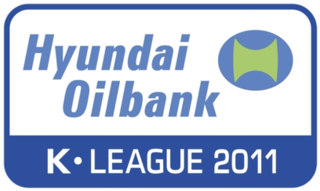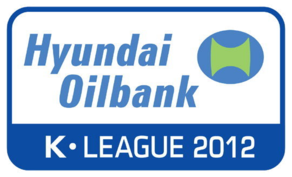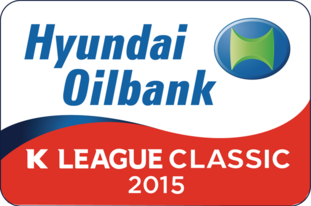
The Pohang Steelers are a South Korean professional football club based in Pohang, North Gyeongsang Province that compete in the K League 1, the top flight of South Korean football. The Steelers were founded on 1 April 1973 as POSCO FC, named after the steel company POSCO, which still owns the club today. They are one of South Korea's most successful teams, having won the K League five times and the AFC Champions League three times.

Ulsan HD FC, formerly Ulsan Hyundai FC, is a South Korean professional football club based in Ulsan that competes in the K League 1, the top tier of South Korean football. Founded in 1983 as Hyundai Horang-i, they joined the K League in 1984. Their home ground is Ulsan Munsu Football Stadium. The club is owned by HD Hyundai Heavy Industries.

Daejeon Hana Citizen Football Club is a South Korean professional football team based in Daejeon that competes in the K League 1, the top tier of South Korean football. At the time of its foundation in 1997, Daejeon Citizen was the first community club in South Korea, not belonging to any company. The club first entered the K League for the 1997 season, finishing in seventh place. In spite of a limited budget, Daejeon won the 2001 Korean FA Cup. It has not achieved sustained success in the K League, historically occupying the middle and lower reaches of the standings each season. At the end of the 2013 season, Daejeon was relegated to the K League Challenge, the second-tier league.
Choi Yong-soo is a South Korean professional football manager and former player. He competed for South Korea at the 1996 Summer Olympics.
The 2006 K League was the 24th season of the K League, which kicked off on March 12. The format of the regular season and playoffs was the same as the one used in the 2005 season. It took a break for the 2006 FIFA World Cup in June and July. The playoff games were held in November.
The 2005 K League was the 23rd season of the K League. It kicked off on May 15, and was finished on 4 December. The format of the regular season and championship playoffs was the same as the one used in the 2004 season.
The 2007 K League was the 25th season of the K League. The format of the league was changed from two stages to single league since this season. Each team played 26 matches against every other teams under the home and away system. After the regular league was finished, the top six clubs qualified for the championship playoffs to determine champions.
The 2004 K League was the 22nd season of the K League. The previous single format of the league was replaced by two regular stages and playoffs in this season. Each team played a total of 12 matches against every other team in each stage. After both stages were finished, two winners and the top two clubs in the overall table qualified for the playoffs.
The 1984 Korean Super League was the second season of top football league in South Korea. A total of eight teams participated in the league. Six of them were professional teams, and the other teams were semi-professional teams. It began on 31 March and ended on 11 November. It divided into two stages, and winners of each stage qualified for the championship playoffs. It gave 3 points for a win, 2 points for a draw, and 1 point for a draw without a goal.
The 2009 K League was the 27th season of the K League. It was held from 7 March to 6 December 2009, and a total of 15 teams contested, including newly formed Gangwon FC.
The 2008 season was Daegu F.C.'s 6th season in South Korea's K-League.
The 2007 season was Daegu F.C.'s 5th season in South Korea's K-League.

The 2010 K League, officially known as Sonata K-League 2010, was the 28th season of the K League. It was sponsored by Hyundai Motor Company, and was held from 27 February to 5 December 2010.

The 2011 K League, officially known as Hyundai Oilbank K-League 2011, was the 29th season of the K League. It was sponsored by Hyundai Oilbank.
The 2011 season was Gwangju FC's first ever season in the K-League in South Korea. Gwangju FC will be competing in K-League, League Cup and Korean FA Cup.

The 2012 K League, officially known as Hyundai Oilbank K-League 2012, was the 30th season of the K League. It was sponsored by Hyundai Oilbank. Since this season, the K League Championship and the Korean League Cup were abolished, and K League introduced the "split system", inspired by Scottish Premier League. After all 16 clubs played 30 matches each under the home and away system, they were split into the group of top eight and the group of bottom eight, playing with each other in a group again.

The 2014 K League Classic was the 32nd season of the top division of South Korean professional football, and the second season of the K League Classic.
The 2008 K League Championship was the twelfth competition of the K League Championship, and was held to decide the 26th champions of the K League. The top six clubs of the regular season qualified for the championship. The winners of the regular season directly qualified for the final, and second place team qualified for the semi-final. The other four clubs entered the first round, and the winners of the second round advanced to the semi-final. Each match was played as a single match, excluding the final which consisted of two matches. Suwon Samsung Bluewings became the champions by defeating FC Seoul 3–2 on aggregate in the final.

The 2015 K League Classic was the 33rd season of the top division of South Korean professional football, and the third season of the K League Classic.
The 2019 K League 1 was the 37th season of the top division of professional football in South Korea since its establishment in 1983, and the seventh season of the K League 1. Jeonbuk Hyundai Motors were the defending champions.










